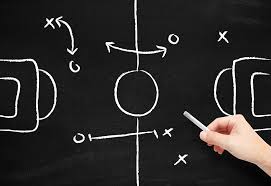“Tactical responses is all you can manage?? I need a strategy!!”
I’ve heard this expressed more times than I’ve shaved with my other hand! (see my post on “Changing hands to effect change“)
Often shot across the desk, meeting/boardroom table, partition, water cooler, etc, at an audience that nods agreeably whist thinking “What does he/she actually want?”
Post-event, the discussion is rife…
it brings to mind the age-old discussion about “Why my sports team is better than yours”.
“You guys haven’t won a game all season! You’re 0-5 and we are at the top of the board”
“Yeah well we’re a developing team we brought on ( x 2) and you’ll see us in the finals if not this year, then definitely the next!”
And contained therein, are clues to the difference between strategy and tactics.
Your strategy is your “Grand Plan” to win (and often!).
It takes into account multiple factors:
* An achievable goal -Win championships. (Garner market share or exploit new frontiers)
* Adequate resources -A develop a winning team of players and leadership. (sufficient capability and sponsorship)
* A realistic time frame -The number of the seasons it will take to reach the goal (business/financial cycles)
* Practical milestones along the way -Top three this season, championship winner the next (20% market share, 2m units sold)
* Disruption -Mid-season loss of key players, or leadership. (Start ups, technology/market shifts, financial impacts)
* Resiliency -How & when do we review and adjust our approach to meet persistent challenges? -Develop tactical approaches and/or revise the strategy.
A strategy is a living thing, because it relies upon and is subject to, living things.
Tactics are different but equally important. They are the decisions you make and the things you do during the process of enacting your strategy. Tactics tend to be short-lived and often repeatable. They are implicit in and integral to strategy.
Imagine yourself as the team coach: Your key player in defense is suddenly out of action. You shuffle players between the bench and the field to fill the missing player’s role to preserve the chance of victory.
You have implemented a tactical response to a problem and it supports the overall strategy.
If you were to say, “Hey! isn’t it just a difference in time frames?” You would be correct to a large extent but thinking about them differently will yield greater value. Having a “Grand Plan” allows you to direct your overall effort.
Tactical responses should ultimately result in progress toward your goal however, they can also signal a review of your strategy and sometimes tactical approaches can actually be contrary as you respond to challenges along the way.
Beware of strategy “by Inference”
Tactics do exist and may appear to be independent of an articulated strategy. They are a form of “mini strategy” that occasionally (sometimes intentionally) may create the illusion of a strategy.
To articulate your strategy as a plan, and then toss it in the dusty filing cabinet in the basement, never to be revisited, risks your strategy becoming your own blurred, orphaned and incongruous epitaph.
So to avoid a modern “Stragedy” (a portmanteau of a “Strategic Tragedy”)
Consider these three key ideas:
Articulate your strategy (The grand plan to win the final).
Use tactics to win each game and deal with challenges.
Maintain an effective strategy (strategising). This ensures that you will win the championship more than once!

